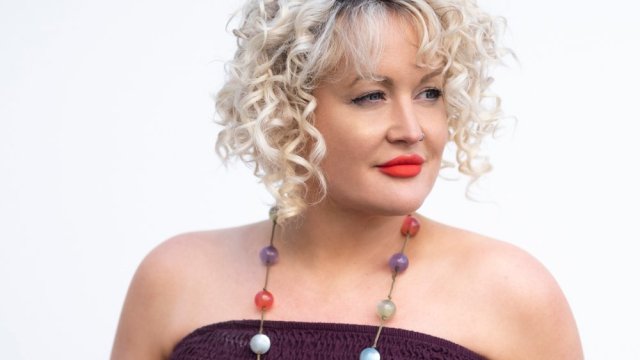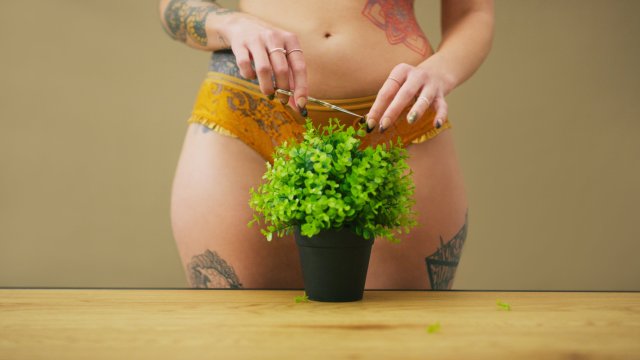
Hey! You there, with the vulva! Have you been convinced that you shouldn’t leave the house unless your unmentionable smells like a bag of bonbons? Have you accidentally internalised misogynistic messages that your vagina is swimming with pondlife that must be cleaned out before it can be inflicted upon another human being? Then, boy, do I have a bulls**t product for you: probiotics for your vagina.
If the paid reviews are to be believed, you can now pop a pill and have a super “fresh” fanny that smells like it’s been Fabreezed. And because I am committed to my work, I have been taking said pills for the last two months and both me and my vagina are ready to report our findings.
In case you have missed this particular fad, let me catch you up. The latest weapon in ensuring vulvas do not smell remotely human are probiotic pills. Yes! The same stuff you get in yogurts that promises to boost your gut health, only these are aiming significantly lower than your intestines.
These pills are marketed as being able to help fight off “bad bacteria” in the vagina by supporting the “good bacteria” in their noble battle. You know that scene in The Lord of the Rings: The Two Towers when Gandalf charges in to fight off the baddies and save Helm’s Deep? Like that, only in this scenario Gandalf is a vaginal probiotic fighting thrush, instead of orcs.
The probiotic pills I have been taking are Wellgard Vitaflora (£24.99 for 30 tablets) and I purchased this product because of their aggressive advertising campaign on TikTok. The “active ingredients” in their product are lactobacillus plantarum, lactobacillus rhamnosus and bifidus animalis lactis.
I am not a scientist, so I spoke to Dr Jen Gunter, leading OB/GYN, vaginal health expert, and author of The Vagina Bible and The Menopause Manifesto. The first thing I asked was just what in the world are lactobacillus plantarum, lactobacillus rhamnosus and bifidus animalis lactis? “They are all different strains of bacteria that can be found in the vagina,” she explained. Fair enough. Front bottoms up, I guess.
I dutifully took one pill a day for two months. Reading through their website, Wellgard makes many of the same claims other brands do: “Probiotics will fight off the bad bacteria and restore balance to your lady bits.” They cite “BV (bacterial vaginosis) and other concerns” as reasons to take their pills.
But look a little closer and there is another underlying message at work: that your vulva smells. They ask if you are “tired of feeling less than fresh down there”. They claim that their product will mean “no more embarrassing odours”, and that “your lady bits (and your partner) will thank you”.
This messaging becomes even more explicit over on TikTok, where paid influencers make quite astonishing claims about their product. Scroll through all their paid commissions and you will find women saying things like, “it’s probably going to make you feel cleaner” and jokes about their man asking, “how comes you smell so great?” There are other promotions that ditch any reference to bacterial vaginosis at all and only focus on how your vulva should smell. “Do you want good kitty-cat smelling fresh?”, asks one influencer, before concluding that “one tablet a day keeps the nastiness away”.
Keeps the nastiness away? Is this where we are in 2023? Peddling cod science to a new generation of young women in order to convince them that the only acceptable vagina is one that smells like a hospital ward? I have been asked to ration the swearing in these articles, but to demonstrate just how enraged I am about this, I am prepared to splurge a whole month’s allowance of f-bombs in telling anyone pushing this narrative to f**k the f**k off, and when they get there, f**k off some more.
Before I get to my review, let’s look at the actual science. The human vagina is absolutely teeming with microbes. It is a 24/7 bacterial bonanza down there, the most common of which are lactobacilli. Lactobacillus microbes are found in the mouth, the intestinal tract, and the vagina. They produce lactic acid, and it is this which is thought to prevent harmful bacteria from getting out of control. (Lactobacillus is also used in cheese production and fermenting sauerkraut, but that’s another article for another day.)
Anyone with a vagina will know that if the delicate balance of this bacterial ecosystem is disturbed, havoc can ensue. Shower gels, hormones, antibiotics, and most certainly penises, can all upset the PH of your microbial zen, resulting in thrush, bacterial vaginosis, urogenital infections, or just a very itchy snatch. New research around the importance of microbiota of the vagina is emerging all the time, but it is a relatively new area of study. There have been studies that show “probiotics play an important role in maintaining the stability of vaginal microenvironment, improving immune defence and blocking the progression of cervical cancer”.
But what is far less certain is if taking probiotics (such as lactobacillus) orally does much of anything to the levels that occur naturally in the vagina. A 2019 article from Harvard University concluded: “It’s not at all clear that taking a probiotic orally will help the vagina.” When you think about it, how would the microbes in a probiotic that is taken orally end up in the vagina? That’s quite the detour.
I asked Dr Jen if there was any research to support the claim that probiotic pills improve vaginal/vulval heath, and she was clear: “There are no quality studies that support the use of probiotics for vulvar health.” What’s more, “there is no guideline recommending people take them for vulvar health”.
I had suspected this would be the case, but it is still quite shocking given the number of the companies peddling vaginal probiotics who are claiming their product is “scientifically proven”. A quick Google search for “vaginal probiotics” will return hundreds of pills and suppositories all making these claims around supporting vaginal health, and warding off thrush or bacterial vaginosis.
It’s junk science, but at least I understand the theory at work: the vagina needs lactobacillus to be healthy – here’s a pill containing lactobacillus. It isn’t proven by science, but this is true about many supplements on the market.
However, I draw the line at the claim that probiotics can “freshen up” the vagina or make the vulva smell better. This is exactly how they are being marketed to young women across social media apps like TikTok, and it irritates me more than thrush and bacterial vaginosis combined.
I asked Dr Jen if any of the claims that a pill can change the way you smell were true, and, predictably, she said they are not. “There is nothing that you can eat or drink to change the smell of the vulva or vagina,” she explained. I immediately asked if that included pineapple because I definitely remember a rumour at school that if you ate more pineapple you would taste sweeter, and nope. That’s nonsense too. “The pineapple rumour is just that, a rumour, and it’s all based in misogyny.”
So, after taking vaginal probiotics for two months, had I created a super foof? Was it a glistening ball of health, stuffed full of “good bacteria”, and smelling like an alpine meadow?
Nope. There was no noticeable difference at all. I tracked my vaginal PH all the way through, and nothing changed, apart from one day when I used a glitter soap I won in a raffle, and I’m not counting that. My vulva doesn’t smell any different and I don’t feel any “fresher”. True, I didn’t get BV or thrush during this time, but I didn’t have it before or after I started on these pills either.
In the good ol’ days of the early 20th century, women were sold Lysol and Zonite floor disinfectants to douche their vaginas. They were told this would promote their natural “daintiness” and “feminine hygiene”. It didn’t. Several women actually died from “uterine irrigation”, but that wasn’t going to stop companies telling women that their genitals require specialist cleaning supplies.
Today, it’s not “daintiness” we are being sold, but “freshness”.
Pills, pads, potions, and lotions, all pushing the message your poor little tuppence needs to be waterboarded or chemically treated. Not only is none of this true, because the vagina is entirely self-cleaning, but seriously, what is wrong with a vulva smelling like an actual vulva? Of course, I should say here that if you are genuinely worried about a new smell or BV, please go and talk to your GP. Do not buy probiotic pills off the internet. Seek proven medical treatment.
Mercifully, carbolic vaginal douches have been taken off the market, but the “vaginal odour” business is still booming. According to the leading market research company Technavio, “the vaginal odour control product market share is expected to increase to USD 1.09 bn from 2021 to 2026, and the market’s growth momentum will accelerate at a CAGR of 5.21 per cent”. A multibillion-dollar industry, built on telling women they smell.
I searched for the projected growth of the penis odour business, and guess what? There is no such thing. No one is out there, flogging penial probiotics or specialist cleaning supplies for your balls. No one is on TikTok telling men to buy products to “keep the nastiness away!”
I am so angry about this – as if vaginas don’t have enough to deal with without quacks flogging pills to try and freshen them up? Vulvas and vaginas are not dirty, dark, stinking cesspits; they are truly incredible things, and you should be proud of yours.
I asked Dr Jen what she would recommend to anyone considering taking vaginal probiotics. Her answer was simple. “I don’t recommend them. These companies need to publish quality studies in peer-reviewed journals for me to change my mind, because women deserve data, not marketing.”
So, there you have it. Vaginal probiotics not only have no scientific evidence to support their use, but what’s even worse is that they are now pushing the message that your vulva needs to be “fresh”. It’s absolutely vile. As far as I am concerned, there is only one thing that stinks around here, and it’s not your vulva.
This post was originally published on this site be sure to check out more of their content.









